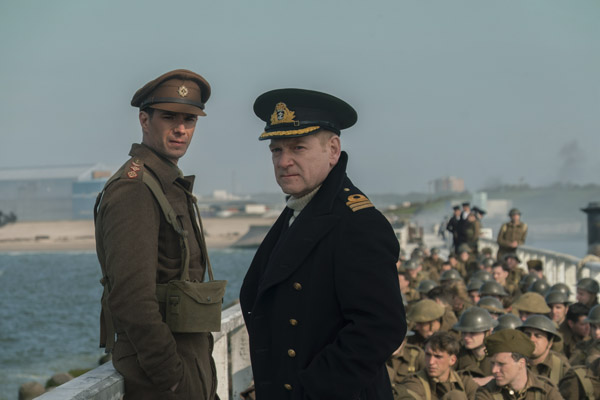![]() Christopher Nolan’s Dunkirk is already being compared to Steven Spielberg’s Saving Private Ryan, and it very well should be. Imagine if Spielberg’s monumental, opening 27 minutes of the storming of Omaha Beach on D-Day were to last for an entire film. Dunkirk takes up that challenge—you are going want to see this on the big screen.
Christopher Nolan’s Dunkirk is already being compared to Steven Spielberg’s Saving Private Ryan, and it very well should be. Imagine if Spielberg’s monumental, opening 27 minutes of the storming of Omaha Beach on D-Day were to last for an entire film. Dunkirk takes up that challenge—you are going want to see this on the big screen.
What has been called as “the Miracle at Dunkirk” occurred in the early part of World War II when the German Army had enclosed Allied troops from Britain, Belgium, France, and Canada on the beaches of Dunkirk, France, which was a day’s journey by boat from England. Over the course of eight days, an estimated 340,000–400,000 Allied troops were evacuated, mostly by small civilian boats. Coincidentally, this event was also covered earlier this year in the more modest but nevertheless inspiring film Their Finest. But no matter how the mass exodus at Dunkirk story is told, it is one of the most remarkable events in modern warfare.
Dunkirk is an experiment on many levels. The film gives cues at the beginning, but it may not become clear until nearly a third of it has gone by that it is being told from three different locales (land, sea, and air) and that each thread takes place at a different time over the course of the evacuation. The overall story line has a beginning, middle, and end, but the film focuses on the locations at different points in the time line, until each flows into the other and it all becomes one cohesive narrative. Characters move in and out of these three different threads, and Nolan maintains the suspense as the events converge. He’s quite deft at withholding from the audience exactly what will happen that will bring everything together.
The film boasts impressive acting, but there is so little dialogue it’s almost irrelevant to refer to any of the characters by name (which no doubt plays on the film’s larger theme of unity). On land, we follow two very young soldiers (Fionn Whitehead and Aneurin Barnard) scared out of their wits and trying any way they can to make it back home alive, even if they have to sneak onto one of the evacuation boats. Also on land are Kenneth Branagh and James D’Arcy as the officers overseeing the retreat. Eventually pop star Harry Styles shows up, but he doesn’t stand in the way of the story.
The portion set at sea follows a civilian man played by Mark Rylance, who along with his son (Tom Glynn-Carney) and his son’s younger friend (Barry Keoghan), has responded to the British government’s call for action and taken his small luxury boat to bring soldiers home.
In the air, two fighter pilots (Tom Hardy and Jack Lowden) zoom over the beach to prevent the Germans planes from picking off Allied soldiers like fish in a barrel. The fighter planes are omnipresent overhead during the other two story lines and work as connective thread for the overall story.
Several scenes go by without anyone saying anything. Whitehead’s and Barnard’s characters communicate to each other solely through nods and gestures. This goes on for so long it becomes conspicuous, making it unclear whether these two are even on the Allied side. Even the minimal dialogue is muffled, clipped, or hard to follow without knowing all of the context. With so little exposition, the complex story is incoherent on purpose, adding another layer of reality to the situation: war is disorienting. Nolan’s film even depicts the immediate effects of post-traumatic stress disorder in Cillian Murphy’s unnamed sole survivor of a downed ship.
Nolan has a flair for time-bending storytelling: dreams-within-dreams, space-time relativity, and interdimensional travel (Inception and Interstellar); villains who are 10 steps ahead of the heroes (The Dark Knight); and here, beginning the film at the end. His storytelling and technical wizardry have always been outstanding, but his films, apart from the “Batman” series, have never had memorable characters. The weakest aspects of The Prestige, Inception, and Interstellar were the characterizations. With Dunkirk, though, he plays to his strengths.
Supposedly Nolan has had this screenplay lying around for 25 years, and his intention has always been to treat it like a silent film. If we can believe him. Remember, this is a guy who makes movies intended to mess with your mind. Dunkirk is easily Nolan’s greatest achievement to date. And I’m going to go out on a limb here and say that it is probably Harry Styles’s, too.

















Leave A Comment